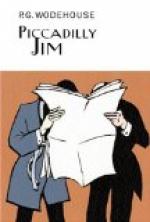Many who enjoyed a merely casual acquaintance with the butler would have looked on this as an astonishingly unexpected revelation of humanity in Bayliss, but Mr. Crocker was not surprised. To him, from the very beginning, Bayliss had been a man and a brother who was always willing to suspend his duties in order to answer questions dealing with the thousand and one problems which the social life of England presented. Mr. Crocker’s mind had adjusted itself with difficulty to the niceties of class distinction: and, while he had cured himself of his early tendency to address the butler as “Bill,” he never failed to consult him as man to man in his moments of perplexity. Bayliss was always eager to be of assistance. He liked Mr. Crocker. True, his manner might have struck a more sensitive man than his employer as a shade too closely resembling that of an indulgent father towards a son who was not quite right in the head: but it had genuine affection in it.
Mr. Crocker picked up his paper and folded it back at the sporting page, pointing with a stubby forefinger.
“Well, what does all this mean? I’ve kept out of watching cricket since I landed in England, but yesterday they got the poison needle to work and took me off to see Surrey play Kent at that place Lord’s where you say you go sometimes.”
“I was there yesterday, sir. A very exciting game.”
“Exciting? How do you make that out? I sat in the bleachers all afternoon, waiting for something to break loose. Doesn’t anything ever happen at cricket?”
The butler winced a little, but managed to smile a tolerant smile. This man, he reflected, was but an American and as such more to be pitied than censured. He endeavoured to explain.
“It was a sticky wicket yesterday, sir, owing to the rain.”
“Eh?”
“The wicket was sticky, sir.”
“Come again.”
“I mean that the reason why the game yesterday struck you as slow was that the wicket—I should say the turf—was sticky—that is to say wet. Sticky is the technical term, sir. When the wicket is sticky, the batsmen are obliged to exercise a great deal of caution, as the stickiness of the wicket enables the bowlers to make the ball turn more sharply in either direction as it strikes the turf than when the wicket is not sticky.”
“That’s it, is it?”
“Yes, sir.”
“Thanks for telling me.”
“Not at all, sir.”
Mr. Crocker pointed to the paper.
“Well, now, this seems to be the box-score of the game we saw yesterday. If you can make sense out of that, go to it.”
The passage on which his finger rested was headed “Final Score,” and ran as follows:
Surrey
First Innings
Hayward, c Wooley, b Carr ....... 67 Hobbs, run out ................... 0 Hayes, st Huish, b Fielder ...... 12 Ducat, b Fielder ................ 33 Harrison, not out ............... 11 Sandham, not out ................. 6 Extras .......................... 10
Total (for four wickets) ....... 139
Bayliss inspected the cipher gravely.




